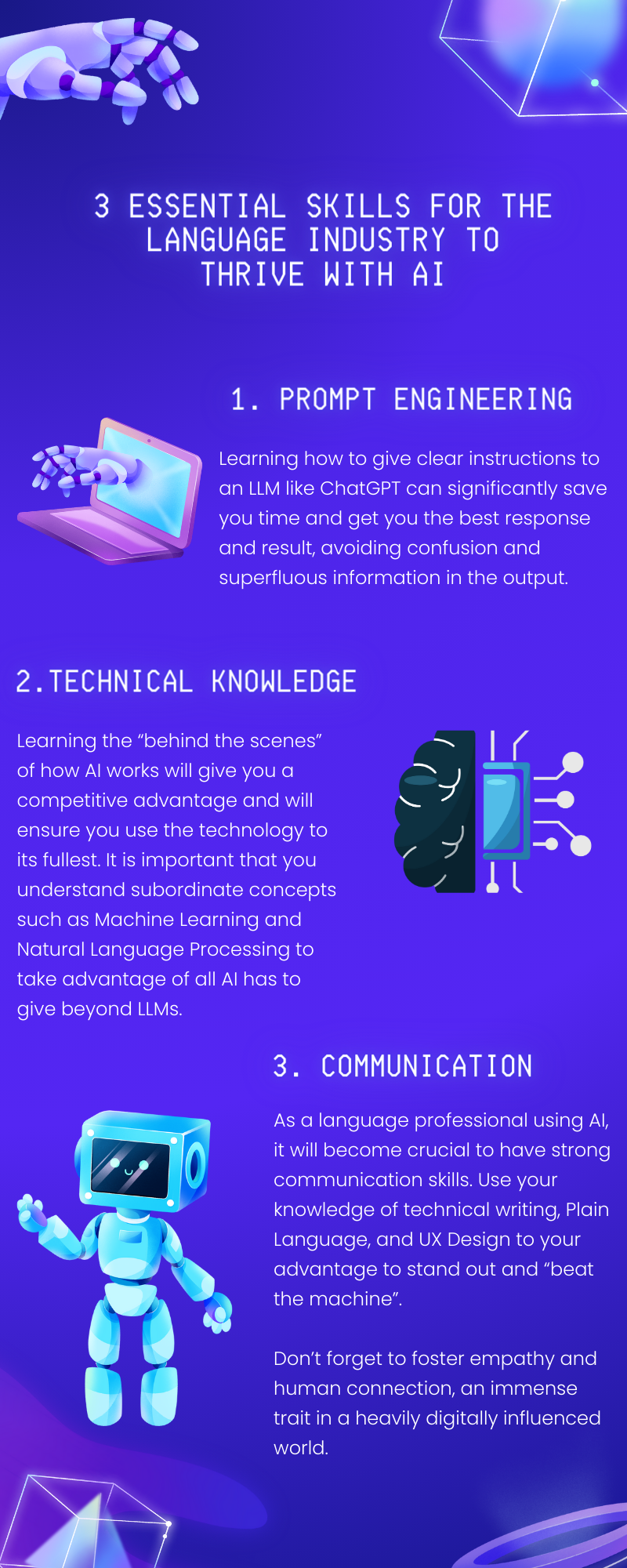- Home
- Resource Center
- Articles & Videos
- The Linguistic Revolution: Unleashing AI in Language & Localization
22 March 2024
The Linguistic Revolution: Unleashing AI in Language & Localization
This article received the 2024 Rising Star Scholarship. It explores the impact of AI on education and the global language industry.

The Localization Industry: Early Adopters of AI
The global language and education industries are experiencing significant changes as Artificial Intelligence (AI) technologies enter the market and increase their user acquisition.
However, AI technologies have been around since the 50s and the language and localization industry has been one of the early adopters of these technologies. Localization companies use machine translation, an AI technology that evolved from rule-based and statistical approaches to the use of neural networks in 2014, and was adopted on a larger scale in 2017 with the implementation of neural machine translation in Google Translate. Since then, the language industries have seen the rise of machine translation engines such as DeepL, embracing the technology and its constant evolution.
With increased access to Large Language Models (LLMs) through the launch of Open AI’s ChatGPT on November 30, 2022, AI has had a significant impact on workflows in various fields, including the language and education industries, as users began to experiment with and adopt these tools. It is for this reason that Andrew Ng describes artificial intelligence as the “new electricity”.
How AI is impacting education and the global language industry
As people continue to experiment with AI, the role of technology in our professional and personal lives has become a topic of interdisciplinary discussion and research.
With seemingly overnight access to ChatGPT and other LLMs, students have begun using these tools to generate content in the form of essays and assignments, sparking debate among professors as concerns of plagiarism and misinformation have been raised. However, when used appropriately, these tools offer revolutionary productivity solutions and a transformative starting point for students and professionals to learn about new topics in a matter of seconds.
The media localization industry, in particular, has witnessed a positive impact on workflow with the introduction of AI solutions. This has led to new services such as AI Dubbing and automatic transcription and subtitling using of speech-to-text engines. This is demonstrated in the following video, which was created using AI-generated dubbing and transcription.
These AI advances have not only streamlined the work of localization professionals in the media industry, reducing or eliminating many tedious, manual tasks , but have also spurred an irrevocable evolution of their professional roles and day-to-day activities as they adapt to the increasing presence of AI technology in their work. For instance, as LLMs evolve, there has been a focus on globalized transcreation where the creation of content for a global audience no longer requires a third party such as a translator. This means that a language service provider (LSP) can create a fully globalized piece of content directly in the target language, rather than translating from a source language.
While AI technology has long been welcomed and widely adopted by professionals in the language and education industries, current debates about the ethical use of AI consider the potential threat to language and education jobs and workflows, with concerns about AI taking over people’s jobs and livelihoods. As a result, many companies in these industries have opted to offer their services using AI tools under the supervision of a human. This type of service is referred to as “human in the loop” and typically involves a subject matter expert who acts as a supervisor of the AI performing a task such as translating or developing educational materials on a particular topic.
Fast forward: The need for a distinctive career path
As AI technology evolves, so do the career opportunities for professionals in the language and localization industry. As machine translation becomes more powerful, translators can move from focusing on translating content to acting as nuanced cultural informants while AI provides draft translations.
Roles within the language industry are likely to become multifaceted, with professionals using AI to perform multiple tasks simultaneously, while single-task-based workflows become obsolete. This shift will create new jobs within the industry where professionals can leverage their human experience and knowledge in order to complement and maximize the development of AI technologies.
As mentioned in the video demonstrating the use of AI technologies for media localization, these technologies will enable a plurilingual framework to content creation. AI will support media content where multiple languages are spoken in the same conversation, or where words in different languages are used in a single utterance, encouraging a shift away from a strictly bilingual or multilingual approach where languages coexist but do not mix as they do in real life.
In order to understand new AI technologies and keep up with their evolution over time, it will be critical for language and localization professionals to develop new skills. Some of these key skills, as shown in the infographic, include proficiency in rapid engineering, technical knowledge of AI, and strong communication skills and empathy for the human connection.
Successfully navigating the AI waters requires more than technical skills. Everything that makes us human, including our life experiences and professional skills, will help us use AI to our advantage. This will be essential as AI adoption becomes the norm. On the other hand, it is important to preserve and cultivate "non-AI" skills. As a professional in the language and media industry, I intend to experiment with AI technologies and constantly learn about the new features and how they can be used to my advantage. At the moment, human-like creativity and innovation are traits that AI cannot be made to produce. Therefore, I intend to nurture my creative side by continuing to create original content such as blog posts, articles, and videos, while using and citing new AI tools to improve the process and outcome. In current and future professional endeavors, networking and collaborating with others in the language industry will be key to maintaining a "human" touch in our highly technical and technological jobs and lives.
An Interview with Simone

Simone Visentin
Simone Visentin is a Programming Coordinator at TLN Media Group and a Masters student in Technical Communication and Localization at the University of Strasbourg. He has degrees and certifications in Communication Studies, Translation, and Business Management from York University and the University of Toronto. Simone has worked, studied, and travelled in 30 counties, including Mexico, Italy, and Canada.


